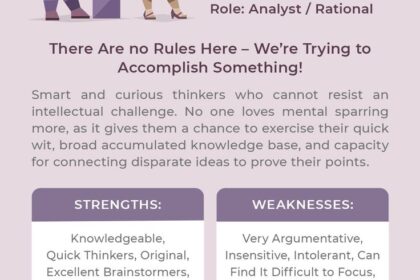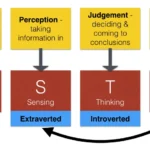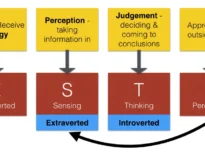
In light of recent research establishing with near certainty that personality traits correlate with success (or failure) as a startup founder, I’ve been fixated on investigating if and how certain personality types are more or less meaningful to entrepreneurship.
The Myers-Briggs Type Indicator (MBTI) is a psychological assessment tool based on Carl Jung’s theory of psychological types. It categorizes individuals into 16 distinct personality types based on preferences in four dimensions: Introversion/Extraversion, Sensing/Intuition, Thinking/Feeling, and Judging/Perceiving. The MBTI is widely used in organizational development, career counseling, and personal growth, offering insights into how individuals perceive the world and make decisions. Its value lies in fostering self-awareness and improving interpersonal dynamics and, in light of the fact that many people dismiss or disagree with the assessments, academic support for the MBTI’s utility in various contexts can be found in research published by the American Psychological Association.
Much of the research in entrepreneurship has been focused on the entrepreneurs and startup founders. With that in mind, I started digging into the fact that mentors or advisors play a different and critical role, that many founders get frustrated with advisors who don’t seem to really be helping, and that there must be a lens to look through at personalities that might in fact be better at advising.
While there isn’t a one-size-fits-all answer, certain MBTI types may have qualities that align well with the demands of advising startups:
Article Highlights
ENTP (The Debater)
ENTPs are known for their innovative thinking, ability to see the big picture, and skill in finding creative solutions to problems. Their enthusiasm for new ideas and capacity to think on their feet can be particularly beneficial in the dynamic environment of startups.
Example: Mark Cuban, an ENTP, is often cited as a successful entrepreneur and startup advisor. He challenges the status quo and thinks outside the box – pushing founders to in what’s critical to their success: doing the same.
INTJ (The Architect)
INTJs are strategic and analytical, with a knack for long-term planning and organization. Their ability to create detailed plans and their forward-thinking mindset can help startups navigate complex challenges and anticipate future needs.
Example: Elon Musk, frequently typed as an INTJ, has a strategic vision (whether you like what it is or not) that has driven the success of multiple high-profile ventures. His approach to problem-solving and innovation exemplifies the strengths of the INTJ type in a startup context.
ENTJ (The Commander)
ENTJs are natural leaders with strong organizational skills and the ability to make tough decisions. Their confidence and decisiveness can help steer startups in the right direction, especially during critical growth phases.
Example: Sheryl Sandberg, well known from Facebook and Meta, is often identified as an ENTJ, and has played a pivotal role in scaling companies. Her leadership and decision-making abilities have been instrumental in her advisory roles.
INFJ (The Advocate)
INFJs are known for their vision and their ability to understand and inspire others. Their empathetic approach can help foster a positive company culture and guide startups with a mission-driven focus. Particularly in the early stages, most difficult, likely to fail, and as a culture emerges, this can make or break the team coming together.
Example: Oprah Winfrey, sometimes typed as an INFJ, has successfully mentored and advised numerous individuals and businesses. Her visionary outlook and empathy make her a powerful advisor.
INTP (The Thinker)
INTPs are logical and innovative, with a talent for abstract thinking and problem-solving. Their analytical skills and intellectual curiosity can be invaluable in troubleshooting and refining business strategies.
Example: Bill Gates, commonly identified as an INTP, has used his analytical prowess to drive technological advancements and mentor emerging tech startups.
MBTI can provide a useful framework, but it’s not definitive. What I’m exploring, and I’d love your opinion, is the notion that the qualities of the personality types, are what founders most need, to get through the early stages of a venture. Share with us your type and if my assessment here makes sense to complement what you lack. If you are one of the above, have you found your advice meaningful or more impactful than what you perceive comes from others?



Yep, I’m the ENTJ
Lina G. Rugova and what would you say makes the best advisor to you?
Paul O’Brien someone who’s available, approachable, guiding, and a great communicator!
Lina G. Rugova let me push that for the sake of this, so, an ENSJ?
Paul O’Brien well… many ENTJs work on their emotional intelligence to better connect with others, understanding that empathy and active listening are crucial for effective leadership. That’s where I stand!
But, ESFJs, being they’re known as Consuls, are naturally more inclined towards nurturing and supportive roles due to their feeling preference, which prioritizes harmony and empathy.
It, this doesn’t mean ENTJs cannot exhibit those listed qualities. It’s about recognizing and intentionally developing those skills.
Ultimately, personality types provide a framework for understanding preferences and tendencies, but individual development and self-awareness play significant roles in shaping one’s abilities and behaviors. Am I right?
It’s great to be an INTJ!
David Goodstein what personality might be the ideal advisor to you?
Paul O’Brien The ENTP resonates with me with respect to innovative thinking and finding creative solutions.
David Goodstein pretty consistent with relationship advice that INTJs and ENTPs can be perfect complements – if they can adjust to putting up with what frustrated one another about each other
The two times I’ve been tested, I was first an ENTJ, then an INTJ. Hopefully, doing something right!
Rupert Meghnot in fairness to it, it is directional.
People who disagree that it’s accurate are missing the point and don’t understand the science. Psychologists are increasingly pointing out that this kind of science is getting incredibly accurate.
That, your test results are easily swayed a bit by a mood, a circumstance, or some such. A bit.
I’m very clearly an ENTP but that only became certain after a lot of people pointed out that I’m not really a J (I tested ENTJ a lot), I just have some tendencies of it.
I’m ENFJ
INTP FTW
Jon Nordby interesting, the best match (suggested) is an INTJ
Which, is one of the best matches or me as well, as an ENTP
[…] “What’s the best Myers-Briggs Personality of Entrepreneurs?” to instead share what personalities make the best startup advisors. Begging then the question of whether or not personalities correlate with quality startup […]
Understood and agreed, Paul O’Brien. My transition to INTG was deliberate. I purposely dialed back my Type A personality, in order to enjoy life more.
I am sure that you will agree that these, and other tests, best serve to enhance communication within organizations that include them as part of their communications processes (and culture).
I used the MBTI — and two other tests — for more than 30 years in business to assess hires and build teams. I am very keen on it and went to school 3 times to understand it.
Some cautions:
1. MBTI identifies “preferences.” It is not absolute.
2. You could be a 52% “E” and a 48% “I” and not really be wildly committed to either of those seeminglyh different personality types.
You can be both.
OTOH, you can be 82% “E” and 18% “I” and you can’t be anything other than a Commander.
3. You are not sentenced to be whatever MBTI tells you you are.
The most powerful Commander type can go against preference and be a careful, scheming, manipulative, introverted manager as part of a program of sublimation.
4. It is a great tool to build teams. You can create complementary teams and have every preference represented in the team (if that is advisable).
5. It is wildly unreliable when dealing with young people. What 23 year old knows whether they are an “E” or an “I” when they’ve never had a real taste of either of those behaviors.
Jeffrey L Minch would love your take on this then, my follow up: The Personality of your VC Matters, Ask Investors their MBTI
https://www.linkedin.com/pulse/personality-your-vc-matters-ask-investors-mbti-paul-o-brien-ylxhc
I went to a military school and was in the Army. Pretty damn sure I was an ENTJ. In business I was clearly an ENTJ.
My father was in the Army forever and when I got my first platoon, I never gave an order until I had checked with the sergeants. I am sure they thought I was an “I” but my father had advised me to never issue an order unless and until the platoon sergeant and squad leaders were on board.
When I was a 25 year old company commander, I was akin to a Chinese feudal war lord.
6. People change and the ENTJ of age 30 is something quite different by age 45.
7. One of the real powers is to know who and what you are. If you are an ENTJ and working with a team wherein someone else is the leader, knowing your own preferences and tendencies will allow you to act counter to your own preferences.
That is why a troop commander will often be a damn good staff officer because he knows who he is and can act accordingly.
8. If you are going to use this tool to support hiring and/or team building, you owe it to yourself to become quite expert.
A handful of other personality tests: Enneagram, MMPI, Cal Pers Test. There are also some useful integrity tests.
Paul O’Brien – and especially prospective Board members, and C suite execs ……
[…] advisors bring real-world experience, they’re a certain type of person, often having walked the same path the founders are navigating. Their networks open doors to […]